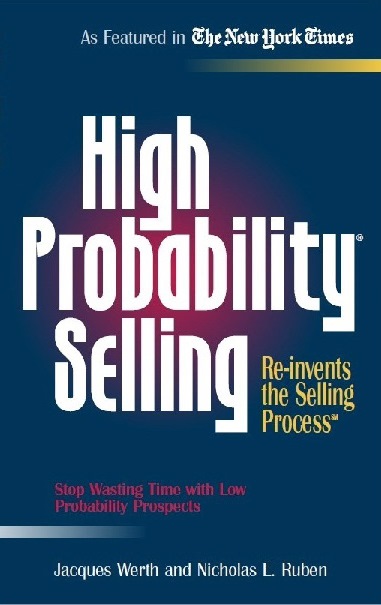
So You’ve Read the Book – Now What?
If you have any questions about High Probability Selling, we are having a live and interactive video meeting on Zoom

In High Probability Prospecting, we teach students to identify themselves first (with their name and company), say what the call is about, and then ask the prospect if that is something they want. That’s what we do when the call is answered by a real person, preferably a decision-maker.
When we find ourselves talking to an answering machine, we have to decide whether to leave a message, or just hang up and move on to the next prospect in our list. Jacques Werth, the founder of High Probability Selling, recommended never leaving a message.
Paul Bunn and I believe that this is not always the best strategy in today’s world. We are trying out other options, and paying attention to results.
And here are some results that I recently encountered. The context is sort of the reverse of prospecting. I was not looking for someone I could sell to. I was representing a buyer who wanted me to find a company capable of producing a specialized product for them. So I made a lot of telephone calls.
Extremely few companies answered the phone with a live person. Most connected me directly to an answering system, with an option of leaving a message in a general voice mailbox. When I did get a live person and explained the purpose of my call, they forwarded me to a number that was also answered by voicemail. This is today’s telephone world, even when you are a potential buyer.
In every case, I left a voice message. I started with my name (Carl Ingalls) and my company name (Embossing Technologies), and then explained briefly what I was looking for. Surprisingly, I got very few callbacks, even after I had left several messages with the same companies.
And then I found out why.
I was sounding just like any other spammer who wanted to sell them something they didn’t want. My name didn’t mean anything at all to them. My company name suggested that I was trying to sell them some product or service related to embossing. And they didn’t listen any further.
If I had started with a clear statement of what my call was about, establishing relevance for the other person, I probably would have had better results.
In the past, we believed that the recipient of a telephone call wanted to know first who is calling, and second what the call is about. That was probably true way back in the old days.
We now believe that the “what” question is more important to the person picking up the phone. The “who” question is secondary.
Although my recent experience was in making phone calls about buying and not about selling, we believe that it is worth testing this idea in outbound telephone prospecting.
We will keep you informed.

If you have any questions about High Probability Selling, we are having a live and interactive video meeting on Zoom
Ultimately, staying in the game is the deepest Why behind our decisions. When examining how we make our decisions, we
Take the first step toward mastering a proven sales system that works. Whether you’re just starting with the High Probability Selling book or looking for advanced training and coaching, we have the tools to help you succeed. Explore our resources and begin transforming the way you sell—consistently and confidently.